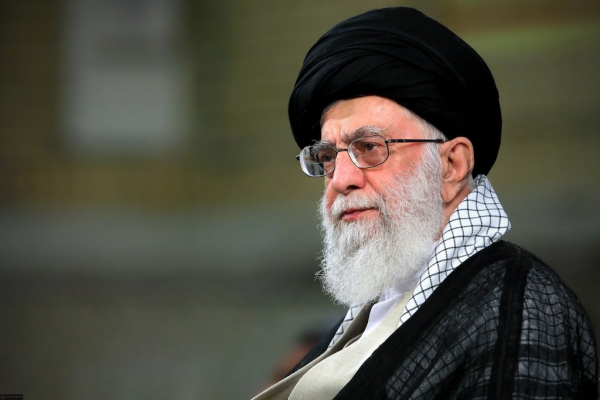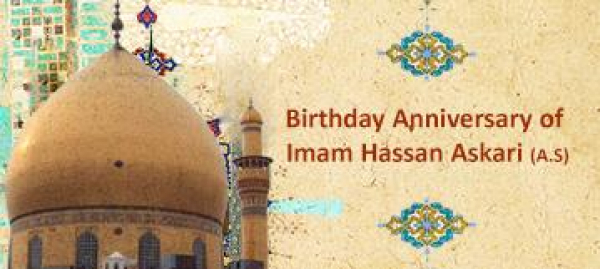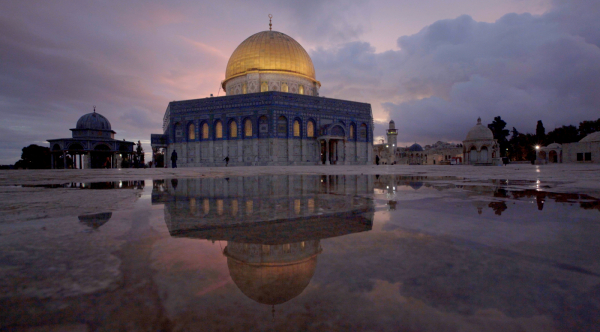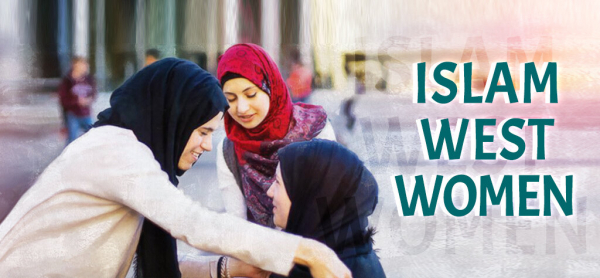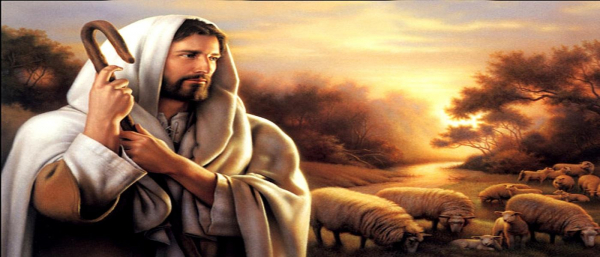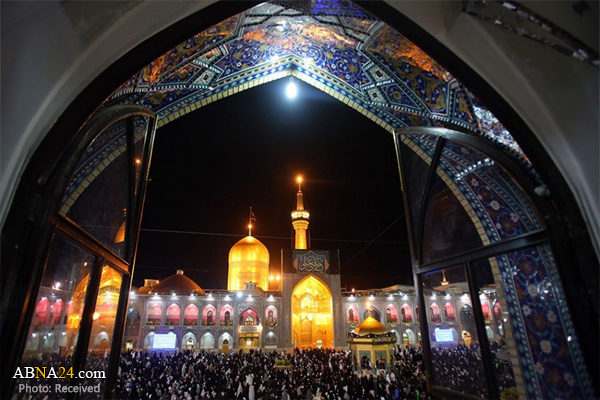hasania
To all who care about Lebanon and Iraq...
To all who care about Lebanon and Iraq...
Speech delivered by Ayatollah S. Ali Khamenei
Birthday Anniversary of Imam Hassan Askari (A.S)
Jerusalem's Al-Aqsa Mosque: 'The side you've never seen before'
The golden dome of Al-Aqsa sits on top of Jerusalem’s Temple Mount, one of the most sacred locations on the planet and revered by Muslims, Christians and Jews alike.
The compound is the third holiest site in Islam. Built in the seventh century, it marks the spot where Islam believes the Prophet Muhammad ascended into heaven.
Its importance is underlined every year during the Night of Power, the holiest time of the holy month of Ramadan when Muslims believe the Quran was revealed to Muhammad. It was also Islam's first qibla, the direction towards which Muslims pray, before it was replaced by Mecca in the year 623 CE.
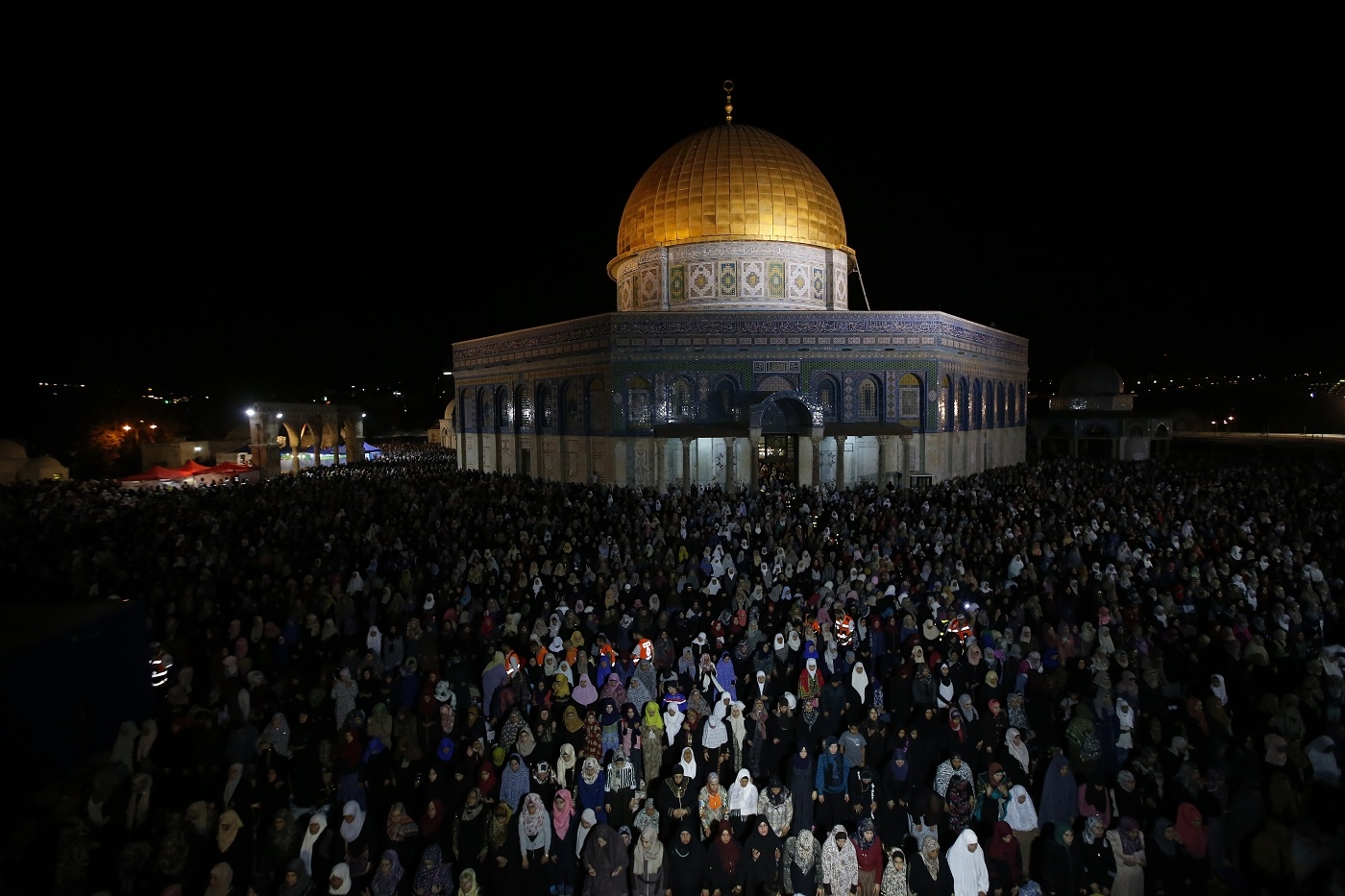
Hundreds of millions of followers spend the day devoted to studying and reciting the Quran. And for hundreds of thousands of worshippers, there is no more sacred occasion than spending the night at Al-Aqsa.
Women, West, Islam: Why are there more women than men converting to Islam? (Iranian Supreme Leader's Opinions)
In this file, you will find selections of Ayatollah Sayed Ali Khamenei, Iranian Supreme Leader, on woman's role in society, religion, family,...
Do Muslims Celebrate Christmas?
Some people ask why Muslims do not celebrate Christmas? Is that because they do not agree on the 25th of December as Jesus birthday? Or is that because they say Christians believe in Jesus as son of God, while Muslims do not believe in Trinity, as well as they believe that Islam is the religion that is more complete than Christianity and all other religions that came in the past; the same way that Christians believe that Christianity is a more complete religion than Judaism.
But let’s put aside the issue of Islamic view on the date of birth of Prophet Jesus (PBUH). The most important fact that causes Muslims not to wish to celebrate Christmas is the matter of identity. Do Muslims expect Christians or Jews to celebrate Islamic occasions? Does it not sound logical that each culture celebrates its own occasions and rituals? Of course, people who were born Muslims in Muslim countries or communities would like to celebrate their own occasions.
But here we are discussing the issue of those who have converted to Islam. Or those who are Muslim and live in societies with a majority of Christians.
Is it forbidden (Haram) for Muslims to celebrate Christmas?

Jesus in Islam
Prophet Jesus (PBUH) is among the Prophets whose name and stories have been mentioned in many chapters of the Holy Quran. This shows the high status of Prophet Jesus (PBUH) and his respected mother – Mary- for Muslims. Prophet Jesus (PBUH) and his mother are so beloved for Muslims that many Muslims name their children after them, and the Islamic society takes every possible chance to admire their position.
It is for this very high level of respect for the Prophet Jesus (PBUH) that Muslims will be offended when he is called as the son of God. Since Allah says in the Holy Quran “ That they attribute to the Most Merciful a son. And it is not appropriate for the Most Merciful that He should take a son. There is no one in the heavens and earth but that he comes to the Most Merciful as a servant.” (19: 91-3)
In the same chapter, Allah says “The Messiah, son of Mary, was not but a messenger; [other] messengers have passed on before him. And his mother was a supporter of truth. They both used to eat food. Look how We make clear to them the signs; then look how they are deluded.” (5:75)

Taking part in Christmas parties for Muslims
The ruling on taking part in Christmas parties is the same as taking part in any other parties. It is allowed to participate in Christmas parties if there is no forbidden (Haram) act taking place; such as drinking, backbiting or forbidden (Haram) music, singing or dancing [i], etc.
In Islamic jurisprudence, there is no harm in celebrating the birthday of Prophet Jesus (PBUH). Also if Muslims do not wish to celebrate Christmas among their cultural occasion, it is forbidden (Haram) to disrespect Christian rituals.
Do Converts Have any Duty Regarding Their Christian Family?
“And We have enjoined upon man [care] for his parents. His mother carried him, [increasing her] in weakness upon weakness, and his weaning is in two years. Be grateful to Me and to your parents; to Me is the [final] destination. But if they endeavor to make you associate with Me that of which you have no knowledge, do not obey them but accompany them in [this] world with appropriate kindness …” (31:14-15)
The above verses clearly define that respecting and caring for parents in the eyes of God is not because of their religion. But He says that you have to respect them, only because your mother carried you for nine months and fed you when you were a weak baby. Therefore non-Muslim parents have all the rights that Muslim parents have. And there is no difference between Muslim or non-Muslim parents if they ask you to do something which is not accepted by God. In those cases, you have to disobey them BUT keep respecting them and behave kindly towards them.

Congratulating Christmas to Christians
Congratulating Christmas to Christians is not forbidden (Haram), as long as it is not considered to be a confirmation of their belief in Trinity, while keeping in mind that you believe that Islam is the last religion sent by God to complete the past religions, but it is rather recommended to respect our relatives, friends or neighbors who are Christians with congratulating them on their happy occasions.
The Duty of Muslims in Celebrating Christmas
Although we discussed that Muslims who live in Islamic countries or Western countries would rather celebrate their own cultural occasions among their Islamic communities, there is a duty upon those Muslims who live in the West and may live with non-Muslim friends and families.
It is a duty upon every individual Muslim to spread the words of God as much as possible. And if a Muslim has the position of clarifying the status of prophet Jesus (PBUH) as a prophet and not the son of God or as a god, then he/ she should not take this opportunity for granted and mention the fact that Jesus (PBUH) was not but a respected Prophet of God.
However, it is not obligatory for Muslims to speak out about this issue when they participate in Christmas parties (in which no forbidden (Haram) act will take place), but if there is a chance of talking about the issue, it would be good to mention the Islamic opinion about the Prophet Jesus (PBUH).
Notes:
[i] Read about forbidden (Haram) music in the related article.
[ii] “This day [all] good foods have been made lawful, and the food of those who were given the scripture is lawful for you, and your food is lawful for them. And [lawful in marriage are] chaste women from among the believers and chaste women from among those who were given the Scripture before you, when you have given them their due compensation, desiring chastity, not unlawful sexual intercourse or taking [secret] lovers. And whoever denies the faith - his work has become worthless, and he, in the Hereafter, will be among the losers.” (5: 5)
References:
[1] http://www.leader.ir/en/book/23?sn=5727
Source: salamislam
What do Islam and Quran say about Jesus Christ (PBUH)?
There are many verses in the Quran about the life and teachings of Jesus Christ (PBUH). Muslims just like Christians revere Jesus, and some even believe that he is more honored among Muslims. They assert Jesus’ holiness and the fact that he was miraculously conceived in the womb of his virgin mother, Saint Mary.
It is also agreed in the religion of Islam that Jesus was supported by some miracles to prove that he was a Messenger of God. However, there are some different beliefs that Muslims have about the nature and life occurrences of this noble Messenger, which are as follows:

Jesus is a Human
Jesus Christ was a human born of a virgin mother. As the last in the line of Jewish prophets, he was sent to guide the Children of Israel with a new scripture. According to the Quran, Jesus was no more than a messenger just like the previous messengers of God who had a worldly life like all the other creatures:
“Indeed the case of Jesus with Allah is like the case of Adam: He created him from dust, then said to him, ‘Be,’ and he was” (3:59).
Quran also affirms that Jesus was the Word of God but not because of an incarnation whereby his flesh became Divine, rather because his spirit was refined to such an extent that it became a mirror that reflected Divinity:
“When the angels said, ‘O Mary, Allah gives you the good news of a Word from Him whose name is Messiah, Jesus son of Mary, distinguished in the world and the Hereafter and one of those brought near [to Allah]” (3:45).
Just as the creation of Adam and Eve who were born without a human mother or a human father, the miraculous birth of Jesus does not grant him a higher status to be God or a part of Him. Therefore, Jesus, like the other earthly humans, lives a temporary life and dies:
“Peace to me the day I was born, and the day I die, and the day I am raised alive” (19:33).
It is also stated in the Holy Quran that Jesus and his mother would eat daily food, which is a typical human act that cannot be attributed to God:
“The Messiah, son of Mary, is but an apostle. Certainly, [other] apostles have passed before him, and his mother was a truthful one. Both of them would eat food...” (5:75)

Jesus Christ is not God nor the Son of God
“He [God] neither begets, nor was begotten” (112:3)
As mentioned earlier, the Quran states that Jesus was a prophet. Prophets are certainly the best humans God has chosen to receive His revelation to guide humankind; they deserve our greatest honors, but not our worship. Jesus Christ was not different in this respect, neither was he God’s assistant in creating and governing the world:
“It is not for Allah to take a son. Immaculate is He!” (19:35)
“O People of the Book! Do not exceed the bounds in your religion, and do not attribute anything to Allah except the truth. The Messiah, Jesus son of Mary, was only an apostle of Allah, and His Word that He cast toward Mary and a spirit from Him. So have faith in Allah and His apostles, and do not say, ‘[God is] a trinity.’ Relinquish [such a creed]! That is better for you. Allah is but the One God. He is far too immaculate to have any son...” (4:171).
So, God alone suffices to rule and supervise the whole universe and all humans’ affairs.

Jesus Christ foretold the coming of Prophet Muhammad (PBUH)
Not only did Jesus affirm the scriptures revealed before him, but he also prophesied the arrival of the last messenger of God after him, i.e., prophet Muhammad (PBUH):
“When the Spirit of truth comes, He will guide you into all truth. For He will not speak on His own, but He will speak what He hears, and He will declare to you what is to come” (John, 16:13)
This is also mentioned in the Quran:
“And when Jesus son of Mary said, ‘O Children of Israel! Indeed, I am the apostle of Allah to you, to confirm what is before me of the Torah, and to give the good news of an apostle who will come after me, whose name is Ahmad” (61:6)
Jesus Christ is a servant of Allah
Jesus himself never claimed to be God incarnate or the son of God; he declared to be a human being and a servant of God, who was advised to worship Him:
“He said, ‘Indeed I am a servant of Allah! He has given me the Book and made me a prophet” (19:30).
“He has made me blessed, wherever I may be, and He has enjoined me to [maintain] the prayer and to [pay] the zakat as long as I live” (19:31)
And when he invited children of Israel to worship Allah, he said Allah is his Lord too and believed he was like the other children of Israel before God.
“[And Jesus said,] ‘Indeed Allah is my Lord and your Lord. So worship Him. This is a straight path’” (19:36)
He strongly forbade association of partners with Allah, saying:
“… ‘O Children of Israel! Worship Allah, my Lord, and your Lord. Indeed, whoever ascribes partners to Allah, Allah shall forbid him [entry into] paradise, and his refuge shall be the Fire, and the wrongdoers will not have any helpers’” (5:72).
Moreover, the Holy Quran says that Jesus himself denied having any qualities of divinity or being elevated to the status of God:
“And when Allah will say, ‘O Jesus son of Mary! Was it you who said to the people, ‘‘Take my mother and me for gods besides Allah’’?’ He will say, ‘Immaculate are You! It does not behoove me to say what I have no right to [say]…” (5:116).
Jesus Christ performed miracles by the will and permission of God
Miracles are seals of a divine mission. All prophets were granted miracles to prove the integrity of their message. These miracles were not performed of the prophets’ own accord or under their power; rather, they were all manifest in their hands by God’s will and permission. Jesus was no exception; the Quran says:
“When Allah will say, O Jesus son of Mary, remember My blessing upon you and upon your mother, when I strengthened you with the Holy Spirit, so you would speak to the people in the cradle and in adulthood, and when I taught you the Book and wisdom, the Torah and the Evangel, and when you would create from clay the form of a bird, with My leave, and you would breathe into it and it would become a bird, with My leave; and you would heal the blind and the leper, with My leave, and you would raise the dead, with My leave;…” (5:110)
Jesus Christ was neither killed nor was he crucified
It is clarified in the Quran that Jesus was not crucified, but instead, he was raised to the heaven by God:
“and for their saying, ‘We killed the Messiah, Jesus son of Mary, the apostle of Allah’—though they did not kill him nor did they crucify him, but so it was made to appear to them. Indeed, those who differ concerning him are surely in doubt about him: they do not have any knowledge of that beyond following conjectures, and certainly, they did not kill him. Indeed, Allah raised him up toward Himself…” (4: 157,158)
Finally, Muslims believe that after Jesus’ departure from the earth, his teachings were distorted. But with the advent of Islam, six centuries later, the truth about Jesus Christ and his teachings were revived and preserved in the last divine book of revelation, the holy Quran. Nowadays, Muslims follow the consistent message brought by Prophet Muhammad (PBUH) as well as all the other holy prophets including Jesus; their lifestyle is more in tune with what Jesus practiced in life, and they highly respect him.
Muslims also hold that Jesus is alive in the same mortal body and at the time during the appearance of Imam Mahdi (AS) he will return to earth, and they will both fill the world with blessings and happiness.
Reference:
[1] The holy Quran
Source: salamislam
What does Quran Say about Mary, the Mother of Jesus?
Mary is one of the outstanding personalities and a distinguished woman in the Abrahamic religions. In Islam, Mary is considered as one of the four celestial women of Paradise, an exemplary role model and a leader of the women of the universe
In the Quran, no woman has been mentioned by her proper name except Mary, and interestingly, her name occurs 34 times in the Quran [i]. Also, a chapter of the Quran was named after her.

source: http://maxpixel.freegreatpicture.com/Church-Saint-Mary-Painting-Stained-Glass-Window-1638689
A Miraculous Birth
Mary was a daughter of Imran and Hannah. Imran, a progeny of Solomon son of David, was one of the leading religious scholars of his time. According to the reports, following a prayer request of Hannah for a child, they were blessed at old age with a baby girl named Mary. However, Imran died before the birth of Mary.
Meanwhile, according to a narration [1], it was said that Imran had informed his wife of a son who by Allah’s permission could heal the blind and raise the dead to life. Thus, Hannah has vowed to devote the child to the service of the Lord in the Sanctuary.
The Quran says:
“When the wife of Imran said, ‘My Lord, I dedicate to You in consecration what is in my belly. Accept it from me; indeed You are the All-hearing, the All-knowing” (3: 35)
Meanwhile, since the conceived child was a girl, who could not be allowed to serve in the sanctuary due to her weakness and menses, Hannah was amazed, and she exclaimed bashfully:
“When she bore her, she said, ‘My Lord, I have borne a female [child]’—and Allah knew better what she had borne, and the male [child she expected] was no match for the female [child she had borne] —‘and I have named her Mary…” (3: 36)
However, contrary to her expectation, Allah graciously accepted her vow by permitting her daughter; Mary to serve the Lord in the Sanctuary:
“Thereupon her Lord accepted her with a gracious acceptance, and made her grow up in a worthy fashion…” (3: 37)
After that, Hannah took her baby to the Sanctuary, and she handed her over to the custodians of the House of God while she returned home.
Guardianship of Mary
There were disputes among the custodians of the Sanctuary about taking charge of the guardianship of Mary. Every one of them wished to take the responsibility, but Zakariyya told them he was more worthy of her since her aunt was his wife.
They later agreed on casting a lot by throwing their pens with which they wrote the Torah in water to decide the guardianship of Mary. In line with a divine will, only the Zakariyya’s pen surfaced over the water while the remaining ones submerged. Thus, Zakariyyah finally took charge of the guardianship of Mary.
“…and He charged Zechariah with her care…” (3: 37)
When Mary attained puberty, a separate room was built for her in the temple so that she may have a maximum concentration on her devotions. Thus, none was allowed to see her or talk with her except Zakariyya, who made provisions for her needs. According to the Quranic report, every time Zakariyya entered her sanctuary to see her, he found some food in her room.
“…Whenever Zechariah visited her in the sanctuary, he would find provisions with her. He said, ‘O Mary, from where does this come for you?’ She said, ‘It comes from Allah. Allah provides whomever He wishes without any reckoning.” (3: 37)

source: http://accs.sg/the-birth-of-mary/
A Divine Prophecy
One day, the Gabriel in the guise of a handsome man [ii] appeared to Mary but she was frightened, and she sought refuge from Allah against him. But he responded that he was a messenger of her Lord to give her a glad tiding of a pure boy.
“…We sent to her Our Spirit, and he became incarnate for her as a well-proportioned human. She said, ‘I seek the protection of the All-beneficent from you, should you be Godwary! He said, ‘I am only a messenger of your Lord that I may give you a pure son.” (19: 17-19)
However, Mary enquired on the possibility of having a child while not being touched by any man. The Gabriel told her that creating a child out of a virgin and without a father is not difficult for God [iii]. After that, Mary by the decree of Allah became pregnant of Jesus, who shall be a sign for the humankind and a mercy to the world. In order to avoid people’s accusations, Mary retreated to a remote place where no one could see her.
However, at the time of childbirth, apart from loneliness, she went through severe pains to such an extent that she aspired for death [iv]. Then, a voice called unto her to console her not to grieve, and she was commanded by Allah to eat from the fresh dates, drink from the spring water and to refresh her eyes by the newly born baby [v].
In addition, Mary was henceforth commanded by Allah to refrain from talking to people for a particular time, but her child would be allowed to speak on her behalf and defend her chastity. Finally, Mary brought her miraculous baby to her people while carrying him in her arms. Some of them accused her of adultery [vi], but in line with divine command, she remained silent while pointing to her new baby.
Thus, Jesus while in his cradle testified to the divinity of Allah, his servitude to Him and finally attested to the chastity of her mother [vii].
Conclusion
In Islam, Mary is held in high esteem, and she acquired an elevated status among the women of the world. She was considered a perfect personality for emulation by the women of the world.
However, Islam in a very strong term repudiates the belief in the divinity of Mary or her being considered a mother of God. She is indeed a chosen and purified servant of God, and she was chosen above the women of the world.
Notes:
[ii] (19: 17)
[iii] (19: 20-21)
[iv] (19: 23)
[v] (19: 24-26)
[vi] (19: 27-28)
[vii] (19: 30-33)
Reference:
[1] Majlisi, Muhammad-Baqir, “Bihar-ul-'Anwar” (Beirut Edition), Vol. 14, P. 203, Hadith 15.
Source: salamislam
Jesus in the Qur'an
Was the Prophet of Islam (S) a prophet at birth?
1. The first aspect of prophethood is tantamount to prophetic mission and the beginning of a procedure which involved promulgation and propagation of the religion as well as the establishment of the Islamic society. In this aspect of the prophethood, the Prophet of Islam (S) was appointed as prophet in Makkah and specifically in Hira Cave when he was only forty years old. He lived for 23 years as prophet and then he departed at the age of 63.[1]
2. The second aspect involves the spiritual status of the Prophet (S) since he was an intermediary between God and His creation. According to some reports, Prophet Muhammad (S) enjoyed the status of prophethood, not just from the time of childhood but before the creation of mankind. It has been reported that the Prophet (S) said:
That is to say the Prophet (S) was a prophet when Adam had not yet been created. This hadith has also been narrated in Sunni sources with little variation:
In any case, having the status of prophethood from early childhood is not surprising about the greatest prophet of human history. That is because some of the earlier prophets also enjoyed the like of such a feature. For example, Prophet Jesus (AS) talked to his mother from the time of his birth consoling her and giving her solace.[4] He then talked to people and introduced himself as God”s servant and prophet.[5] It has been said that God, the Almighty, perfected Jesus” intellect in his childhood and appointed him prophet and sent him to people at the same time. It was due, mainly, to his perfect intellect that he became duty-bound (mukallaf) at the time of his childhood.[6]
Imam Ali (AS) also says about the Prophet”s childhood: "From the time of his weaning, Allah had put a mighty angel with him to take him along the path of high character and good behavior through day and night."[7]
This saying of the Imam (AS) indicates that the Holy Prophet (S) was in communion with the spiritual realm from infanthood, just as we also believe that the Prophet (S) was infallible from his birth[8] and he enjoyed the status of imamte and wilayah.[9] It is not far from truth that the Prophet (S) had these positions from the very beginning of creation rather before the creation of light but his role as a prophet amongst the people began at the age of forty.
